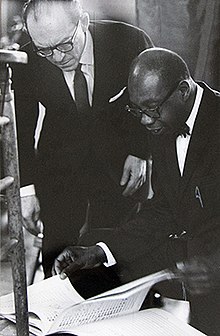George Walker (composer)«Dii
George Walker | |
|---|---|
 Walker, holding the score, in 1968 | |
| Born | George Theophilus Walker June 27, 1922 Washington, D.C., U.S. |
| Died | August 23, 2018 (aged 96) Montclair, New Jersey, U.S. |
| Alma mater | Oberlin College |
| Occupation | Composer, educator, autobiographer |
| Years active | 1940s – 2012 |
| Awards | Pulitzer Prize for Music (1996) |
George Theophilus Walker (June 27, 1922 – August 23, 2018) was an African-American composer, educator and autobiographer. He was the first to win the Pulitzer Prize for Music.[1] He received the Pulitzer for his work Lilacs in 1996.[2][3]
Contents
- 1 Early life
- 2 Career
- 3 Personal life
- 4 References
- 5 Other websites
Early life[change | change source]
Walker was born in Washington, D.C..[4] He studied at Oberlin College.
Career[change | change source]
Walker taught music at Columbia University, Wayne State University, Wellesley College, Temple University, Washington University in St. Louis, Williams College and Montclair State University.[5]
In 1946, Walker composed his String Quartet no. 1. A string orchestra arrangement of the second movement of that work received its world premiere in a radio broadcast that was conducted by pianist Seymour Lipkin.
Walker was elected to the American Academy of Arts and Letters in 1999.[6] The following year, Walker was inducted into the American Classical Music Hall of Fame.
Washington, D.C. Mayor Marion Barry proclaimed June 17, 1997 as “George Walker Day”.[7] in the nation's capitol.
His autobiography, "Reminiscences of an American Composer and Pianist", was released in 2009 by Scarecrow Press.[8]
Personal life[change | change source]
Walker was the father of two sons, violinist and composer Gregory T.S. Walker,[9] and playwright Ian Walker.
Walker died on August 23, 2018 from a fall at a hospital in Montclair, New Jersey at the age of 96.[10]
References[change | change source]
- ↑ "The Pulitzer Prizes". Pulitzer.org. Retrieved October 1, 2016.
- ↑ De Lerma, Dominique-Rene. "African Heritage Symphonic Series". Liner note essay. Cedille Records CDR061.
- ↑ Walker, George (2009) Reminiscences of an American Composer and Pianist, Scarecrow Press, p. 153
- ↑ "Walker, George Theophilus (1922- ) - The Black Past: Remembered and Reclaimed". Retrieved October 1, 2016.
- ↑ Siberz, Heidi. "George Theophilus Walker: February's Contemporary Composer". Indiana Public Media. Retrieved October 30, 2016.
- ↑ "American Academy of Arts and Letters - Current Members". Artsandletters.org. Archived from the original on June 24, 2016. Retrieved October 30, 2016.
- ↑ "George Walker: Prominent Composer & Washingtonian Grew Up on Sherman Avenue". Park View, D.C. December 24, 2012. Retrieved October 1, 2016.
- ↑ George Walker. "Reminiscences of an American Composer and Pianist, By George Walker, 9780810869400 | Rowman & Littlefield". Rowman.com. Retrieved October 1, 2016.
- ↑ Walker, George (2009) Reminiscences of an American Composer and Pianist, Scarecrow Press, p. 156
- ↑ George Walker, Trailblazing American Composer, Dies At 96
Other websites[change | change source]
- George Walker official website
- A 2017 Conversation with George Walker (includes video excerpts)
- George Walker interview by Bruce Duffie
- 2012 George Walker interview by Ethan Iverson
- George Theophilus Walker, African American Composer & Pianist at AfriClassical.com
- George Walker, Composer Documentary produced by NJTV